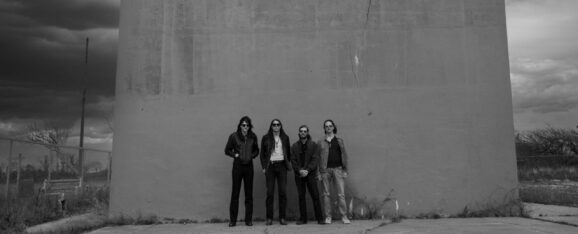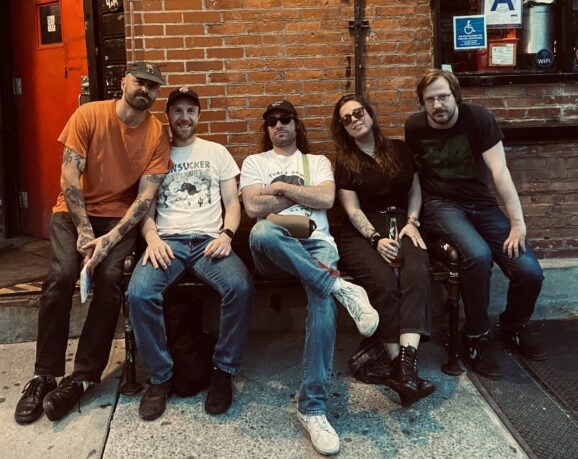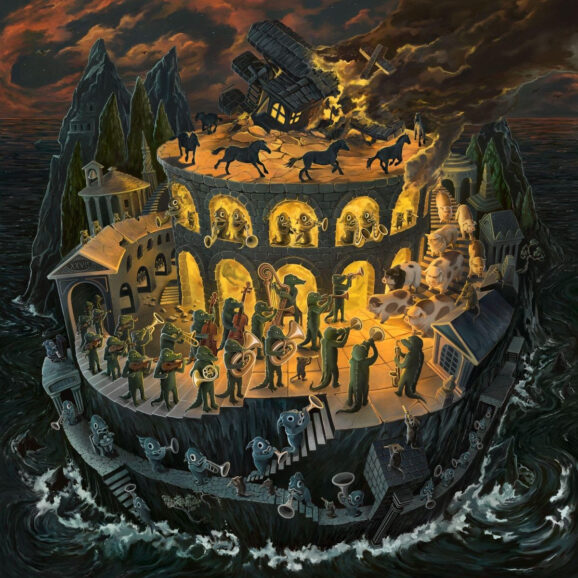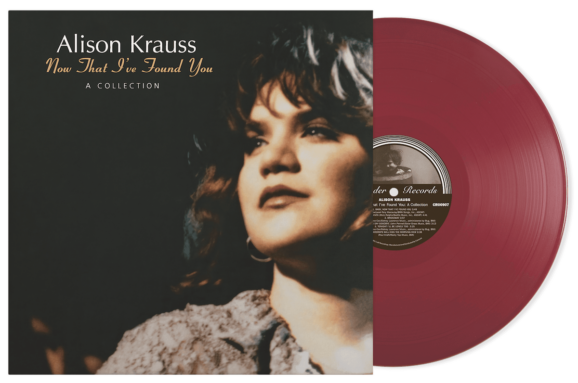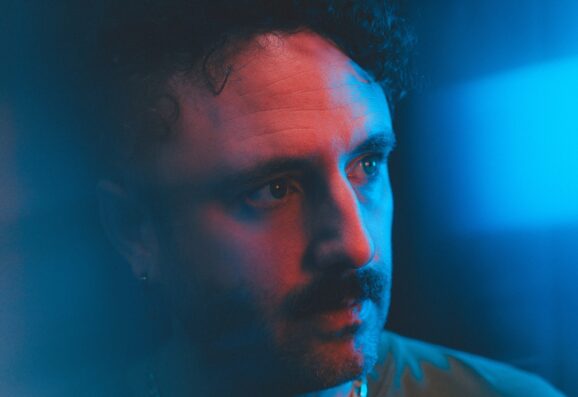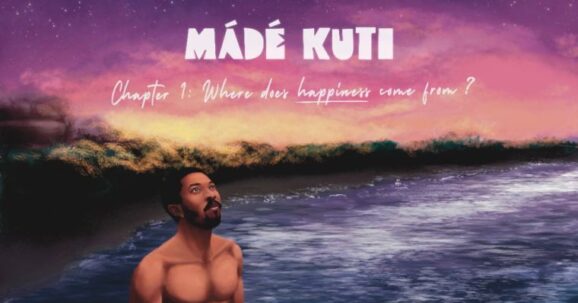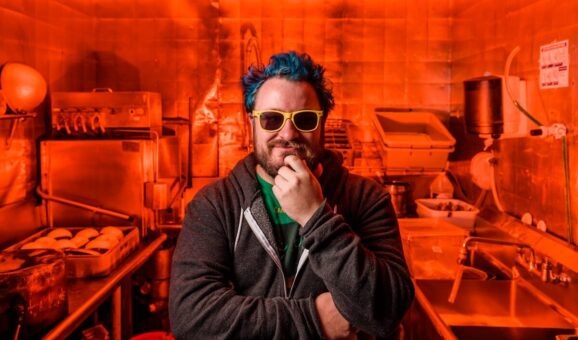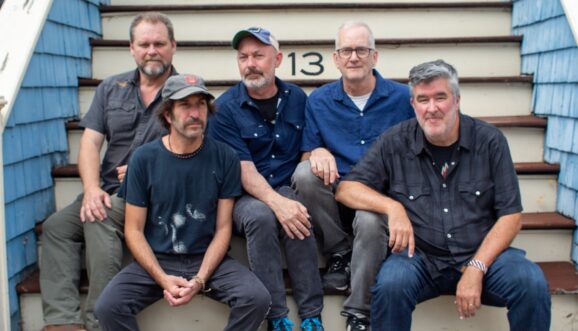Over the past decade, the Texas-based, punk-influenced Americana band The Vandoliers have worn grooves into the highways on countless tours across the U.S. Their albums and raucous live sets blend traditional and outlaw country music with roots rock and Tejano horns, for a remarkably original sound. Over time, they have slowly, steadily been building up a global fan base, allowing them to finally play their first proper tour of Europe in 2022 on the strength of their self-titled album.
But in the early stages of working on their next record, frontwoman Jenni Rose lived in fear that the truth about who she was would destroy everything she and her band had fought so hard to build. For years, she buried that truth beneath silence and the numbing haze of alcohol, afraid that coming out would cost her the music, the love, and the family she had. But as the band poured themselves into Life Behind Bars—their latest and most vulnerable album yet—Rose found the strength to face the pain she’d carried for so long. She opened up about her struggle with gender dysmorphia, a fight that had shaped her life in secret.
Coming out as a trans woman to her family, her bandmates, and those she loved wasn’t just an act of bravery—it was a moment of transformation. In allowing herself to be truly seen, she helped create an album that gives voice to a story she once believed would remain forever silent.
She spoke with Glide Magazine recently about the struggle to finally get where she is now, working with legendary producer Ted Hutt, and how Tennessee’s homophobic drag ban helped lead her on the path to eventually coming out as a trans woman and living as her true self for the first time.
Light Behind Bars was your first time working with Ted Hutt, right?
Yes, we did two songs in LA before we did this album. It was the first full-length album we did with him.
I read somewhere that in the early stages of this album, you went to him with some songs, and he said something to the effect of ‘they’re not ready yet, or they’re too superficial, or they’re not personal enough.’ Is that correct?
Yeah, he said superficial. As a longtime songwriter, that was tough. I just want to be the best I can possibly be, and I respect Ted very much and the songs I was giving him were the songs that I wrote, you know, blacked out in Europe for the first time on the road. You know, kind of a superficial time in my life. I wasn’t all there; I was drinking a lot. When I started talking to him, I prefaced it by saying, ‘I just got sober and I’m gonna keep writing, but this is where I’m at right now.’ And I think he took those songs and said, ‘Okay, this person can write, but these songs are not as good as they could be.’ He saw enough potential to work with me for the next two years in writing this album. I’m glad that he told me that. Is it hard to get criticism? Yeah, I guess, but I get it all the time, so I guess I’m used to it.
Looking back, do you agree that those songs were too superficial, especially considering how personal an album Life Behind Bars ended up being?
Absolutely. I admit, I am writing my best work now. Everything before this was behind a glass wall, at least as a writer. I’d let people see me, but they could never get close, and now that that barrier is gone, my lyrics are more meaningful, they are more open, more vulnerable, more truthful, without worrying about judgment. It’s a really great place.
As I progressed with Ted, I learned how to awaken those things in me and how to tap into them. I went to him not only as a producer but also as a mentor, and I got one, and it served me really well.
Have you been surprised by the amount of reaction this album has received and how overwhelmingly positive it is?
Yes, I’ve noticed a big difference in the reviews from what we usually get. We tried so hard. Every person in this band really did everything they could to expand their reach. And we had two weeks in the desert at Sonic Ranch, and we got so creative. I just wish we could have had two more weeks and really dived in. I just can’t wait for the next one. It was so great to be in such a creative space, and it was really cool to go through it. I guess on the other side, it was really hard in my room, but the studio time was great. But the time alone was hard.
If you listen to the album without knowing about your sobriety, without knowing about your dysmorphia, you can still obviously tell it’s a very personal album. Was there a point in time in writing this album – maybe with a certain song – where you kind of felt like, I guess I’m all in on being personal and revealing who I really am?
Yeah, the song “Evergreen.” I had written something like 35 or 40 songs, and some of it was really good, some were fine. None of them were really bad, it was more like what did Ted want to hear. And he snagged “Evergreen,” and I’m like, ‘oh, that’s the one about being trans.’ And I feel like that was the moment. I was already going through it in my room thinking ‘oh, I think I have dysmorphia. I think this is happening and it’s really terrifying, and I don’t know if I’m going to lose everything I have worked on my whole life.’ Band, wife, kids, family, the whole narrative of being trans is pretty difficult, but it’s real and I have to accept it and that’s what I was meditating on while I was there and when I left. Probably about a week later I came out to my wife.
How was it coming out to your band?
I called up Laura Jane Grace (another trans musician).
That is definitely the best person to call on to get advice on coming out to your band.
Well, yeah, I was very lucky. It’s pretty cool to have a main line to someone like that.
With the band, obviously, you guys have been together for a while, so there’s a closeness there I would assume, but there’s still got to be a fear that maybe not everyone’s as cool as you think they are.
I texted Laura and said, ‘hey, how did you come out to your band? I’m asking for a friend and that friend is me.’ After she flipped out about it, she started helping me. I had to wait until they weren’t drunk and everybody got food and I waited until everybody was in a pretty good mood. So, we went to Taco Bell one morning and got everyone Taco Bell. Everybody was so happy, and they were all sitting there and I turned around and just started telling them about what I have been going through in my life and I had been really distant from them for about two years and while we were working on the record. I was always reading a book, I was always journaling, trying not to relapse and drink again. I got really distant, and my relationships were suffering because of it and on November 2024, I turned around and told them what was going on. And they got their friend back. Ever since then, things have been really, really great.
I told them and they just had to figure out what it all meant. Everybody was there and they were all happy for me. We were staying at the El Rey, and we went to the hotel bar and it was queer night, and it was just perfect timing. There’s a picture of me, all tomboy, on my first queer night, and that was kind of the beginning of my social transition.
Not to oversimplify it, but is it true that the 2023 drag ban enacted in Tennessee played a role in you finally confronting your gender dysmorphia?
Well, I had just started being like ‘how do I ease this dysphoria without ever telling anyone about it?’ without it getting to the place where I would be trans. And then my friends were like ‘let’s wear dresses to protest this ban.’ And I was like yeah, let’s do that. I’d never played in a dress. I’d never done it outside of a room. I’ve never (worn a dress) unabashedly. What’s the harm? The show is not going to be that big. It was just going to be a show; it was going to be a fun show, but it was just going to be a show. And then we played all of these songs that had to do with a feminine personality, We went out there and did it in dresses and suddenly it went viral, and I thought, ‘Oh shit, this is bad. I’m trans.’ And I didn’t think about that thought again for like six months. And then we started going into the studio and all of this stuff started piling on. And it is something that had been sitting in the back of my mind my whole life. It was something I didn’t want to think about, something I repressed.
For a while, I was super good at it. If I was blackout drunk, I was all masculine. But that’s not me, that’s not who I am as a person, and then as I was trying to get sober, I really had to address why I was drinking. It was dysphoria and when I accepted that part, it was about hiding it at all costs. And then after that, when we went viral and I was doing all of these interviews. Maybe that was my time (to come out), but I just wasn’t ready yet. Then I made this record, and I was ready. I started with my family and then I moved to my band. Then I immediately called my agent and my manager because if I was going to get kicked out of my band I needed to know if my agent was going to fire me and I would get dropped by my label. And everybody stuck around, and everybody has been good to me, and I lost no one of any importance in my life, and I am so grateful for everyone.


